After testing a number of payment processors, I find that small businesses need a retail payment processing system that is easy to use, works with popular point-of-sale (POS) software, and offers quality customer support.
The best processors offer flexible solutions so retailers can accept payments made curbside, on the go, throughout the sales floor, and via an online store.
The best retail credit card processing companies are as follows:
- Square: Best overall (and free) retail payment processor
- Payment Depot: Custom fees for midsize retailers
- Helcim: Best for the lowest processing rates
- CDGcommerce: Best for high-ticket items and B2B
- Chase Payment Services: Best for same-day deposits
- PayPal: Best for international and online retail
- Shopify: Best for ecommerce and omnichannel sales
Retail Payment Processors Compared
Our Score (out of 5) | Monthly Fee | Transaction Fee Type | Payment Hardware | Payment Features | |
|---|---|---|---|---|---|
 | 4.8 | $0–$89 with POS | Flat rate | Mobile, Handheld POS, Countertop | Invoicing, Recurring, CBD Program, International |
 | 4.56 | $0 | Custom interchange plus | Mobile, Handheld POS, Countertop | Invoicing, Recurring, Level 2 & 3 Data, Surcharging |
 | 4.45 | $0 | Interchange-plus | Mobile, Handheld POS, Countertop | Invoicing, Recurring, Levels 2 and 3 Data, Surcharging, International |
 | 4.4 | $0–$199 | Flat-rate Interchange-plus Wholesale subscription | Mobile, Countertop | Invoicing, Recurring, Level 2 & 3 Data |
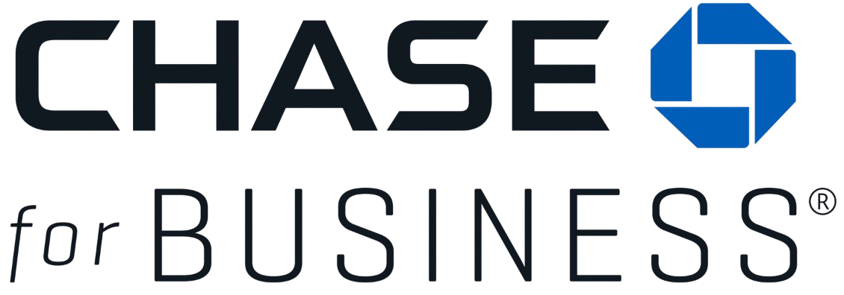 | 4.34 | $0-$9.95 | Flat-rate | Mobile, Handheld POS, Countertop | Invoicing, Recurring, Level 2 & 3 Data |
 | 4.3 | $0 | Flat-rate | Mobile, Handheld POS, Countertop | Invoicing, Recurring, International |
4.16 | $5–$399 with POS | Flat rate | Mobile, Handheld POS, Countertop | Invoicing, Recurring, International | |
Looking for a high-risk retail payment processor? If your business sells CBD or cannabis products, alcohol, tobacco, or firearms or is in gambling, travel, or legal and financial services, you may need a high-risk merchant account provider. Our top recommendation is PaymentCloud. Visit PaymentCloud to learn more.
Square: Best Overall Retail Credit Card Processor

Pros
- Flat-rate, transparent pricing
- Inexpensive payment terminal options
- Offers some of the best card readers on the market
Cons
- Not cost-effective for businesses processing over $250,000 annually
- Locked into Square POS software and hardware
- Difficult-to-reach customer service
Overview
Who should use it:
Small and new businesses with limited budgets needing an all-in-one POS solution
Why I like Square:
Not only does Square have a competitive flat-rate processing fee, but it also offers a free POS and online store preintegrated with Square Payments. Additionally, every Square user gets a free magnetic stripe reader. I also like how it has additional affordable hardware options—the least expensive on this list.
When it comes to payment methods, Square is no slouch. Square Afterpay lets customers buy now and pay in four installments, a big asset for larger-ticket sales both in-person and online. In addition, it has over 200 native integrations, including other POS systems, accounting, ecommerce, delivery, and loyalty.
That said, you can only use Square Payments within the Square ecosystem, so if you prefer more flexibility in choosing your POS software or hardware, check out alternatives to Square instead.
- Merchant processing fee: $0-$89 per month (includes POS software)
- Card-present transaction fee: 2.6% + 10 cents
- Card-not-present transaction fee: 2.9% + 30 cents
- Chargeback fee: Waived up to $250 per month
- Contract length: Pay as you go
- Setup fee: $0
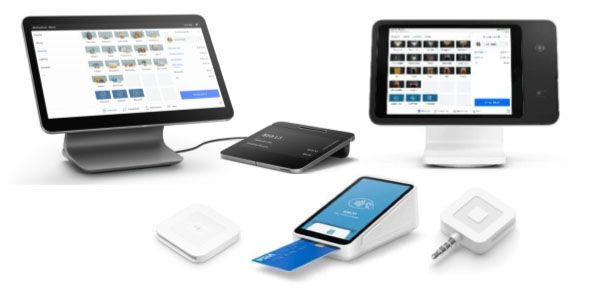
Square hardware and card readers (Source: Square)
Square’s credit card processing hardware ranges from mobile to countertop readers. Price starts at $10-$799 with financing options available and the first magstripe reader free.
- $0 chargeback fee
- Easy dispute management
- Invoicing with ACH payment options
- Free POS system and online store
- Virtual terminal for billing and phone orders
- App marketplace includes QuickBooks integration
- Send payment links via text, email, or copy-and-paste
- Afterpay buy now, pay later (BNPL)
- Square ecosystem of small business tools includes payroll and banking
Continue reading about Square:
- Check out our full Square POS review.
- Square leads our lists of best retail POS systems, top credit card processors, and best POS systems for small businesses.
Payment Depot: Best for Midsize Businesses

Pros
- Custom interchange-plus pricing
- No contract required
- SMS text payments supported
- Extensive POS and ecommerce integrations
Cons
- For US merchants only
- Custom quote required for all hardware pricing
- Next-day funding with fee
- 30-day processing of cancellation (so you pay an additional monthly fee after canceling)
Overview
Who should use it:
Midsize retailers with steadily growing sales
Why I like Payment Depot:
Recently, Payment Depot changed to a custom-quote interchange pricing model. I have personally been waiting for this change. To me, this move makes Payment Depot a strong competitor to Helcim, which also offers traditional merchant accounts and interchange plus rates.
Payment Depot is ahead of Helcim in this evaluation because of its wide range of software integrations and hardware options. Payment Depot operates on Fiserv and TSYS networks and supports a wide range of card readers. You’ll find hardware options from Clover, Poynt, SwipeSimple, Dejavoo, and First Data. You’ll need to contact Payment Depot for pricing, but whether you are looking for PIN pad readers, mobile readers, simple tap and swipe readers, or full POS systems, Payment Depot has you covered.
- Merchant processing fee: $0 per month (includes POS software)
- Card-present transaction fee: Custom interchange plus
- Card-not-present transaction fee: Custom interchange plus
- Chargeback fee: $25
- Contract length: Month-to-month
- Setup fee: $0
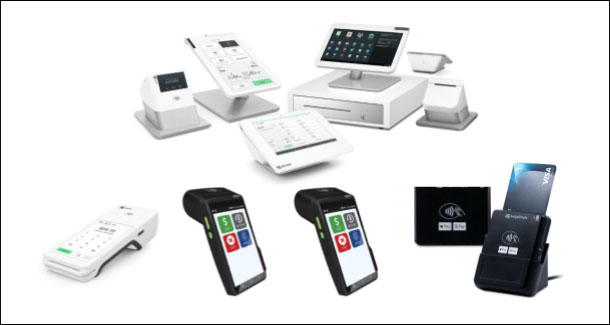
Payment Depot hardware and card terminals (Source: Payment Depot)
Payment Depot offers a variety of card terminals and POS, including Clover. Contact Payment Depot for pricing.
- Custom plan options available
- Accept mobile payments via SwipeSimple app
- Save cards on file
- Virtual terminal with manual card entry or Bluetooth-connected card reader
- Clover and Poynt POS systems available
- Level 2 processing (for B2B transactions) available to all merchants
- Business funding
Learn more about Payment Depot:
- Payment Depot’s wholesale pricing makes it one of the cheapest payment processors in the market.
- Payment Depot is our choice for the best virtual terminal for established businesses needing custom rates.
Helcim: Best for the Lowest Processing Rates

Pros
- Free fee optimization and automation tools
- No long-term contracts or cancellation fees
- Excellent 24/7 customer support
- Tools for an online store and recurrent billing included
Cons
- Pricey card reader
- High-risk merchants not supported
- Volume discounts only offered to businesses processing over $50,000 per month
- Add-on fee for AMEX transactions
Overview
Who should use it:
Fast-growing businesses looking for automated discounts and fee-saving features
Why I like Helcim:
Helcim is a credit card processing and merchant services company that, like Payment Depot, offers interchange-plus pricing. What’s unique to Helcim is that its rates are broken up into tiers, and your fee is adjusted automatically based on a three-month processing average of your card processing volume.
The beauty of this pricing scheme is that you don’t need to contact Helcim to renegotiate; you will automatically receive the lowest rate you qualify for.
What I like best, however, is that Helcim gives you all the opportunities to pay only the lowest fees by optimizing your transaction data. Aside from automated volume discounts, it generates all the information needed for your transactions to qualify for lower B2B rates. What’s more, Helcim merchants who accept ACH payments and debit cards are preapproved for its surcharging program. You can toggle this feature on and off for both in-person and online payments.
However, like Payment Depot, Helcim does have an application process that could exclude new businesses. Square would be the better option if you are looking for a fast setup.
- Merchant processing fee: $0 per month (includes mobile POS software for handheld POS terminal)
- Card-present fee: Interchange plus 0.15% + 6 cents to 0.4% + 8 cents
- Card-not-present fee: Interchange plus 0.15% + 15 cents to 0.50% + 25 cents
- American Express transactions: 0.10% + 10 cents
- Chargeback fee: $15 refundable
- Contract length: Pay as you go
- Setup fee: $0
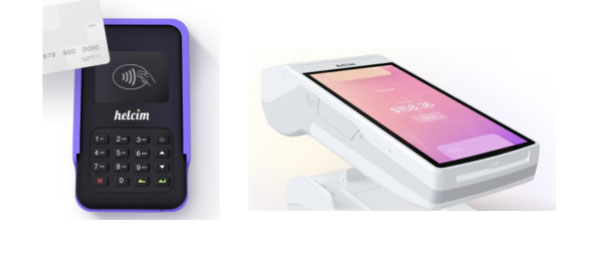
Helcim’s payment terminals (Source: Helcim)
Helcim provides two card payment terminals, a mobile card reader with a PIN pad ($99) and a standalone handheld terminal with built-in POS software ($329 financing options available).
- Discount based on card processing volume
- Processing rates drop automatically as you increase your processing volumes
- $0 membership fees
- Free credit card processing program
- Free POS app
- Free online store
- Invoicing and subscription tools
- Virtual terminal
- Recurring billing
- Subscription management
- Guided chargeback dispute resolution
Related reading: Helcim also leads our list of free credit card processors. Learn more.
CDGcommerce: Best for High-ticket Items & B2B

Pros
- Both free and paid plans to support all the different business types
- Chargeback Collector tool with dispute management and collections assistance
- Integration with PastePay Cloud POS, Vital POS, and Harbortouch Echo
- No contracts
Cons
- Enrollment in PastePay (for an additional $79 monthly cost) required to get invoicing and card-on-file payments
- Wholesale subscribers must pay all monthly fees in an annual lump sum
- Must purchase POS hardware from a third party
Overview
Who should use it:
B2Bs and other SMBs that sell large ticket items
Why I like CDGcommerce:
CDGcommerce is a merchant account and payment processor that offers multiple membership types depending on your processing volume. Users can choose from a flat-rate model (similar to Square), an interchange-plus pricing model (like Helcim), or a wholesale model that pairs a monthly fee with low interchange-plus fees. This instantly makes CDGcommerce one of the most versatile entries on our list.
To me, however, CDGCommerce sets itself apart with its wholesale plan, offering the lowest rates for businesses that process high-ticket sales and B2B sellers—even lower than Payment Depot’s wholesale rates.
So, if your business regularly processes more than $200,000 a year, choose CDGcommerce’s wholesale plan for the best value. However, if your transaction volume is lower, you’re better off with Helcim’s automated volume discount rates that won’t charge you extra for additional payment services, unlike CDGcommerce.
- Merchant processing fee: $0-$199 per month
- Card-present transaction fee: 2.75% + 30 cents/Interchange + 0.25% + 15 cents/Interchange + 5 cents-10 cents
- Card-not-present transaction fee: 2.90% + 30 cents/Interchange + 0.30% + 10 cents/Interchange + 5 cents-10 cents
- Chargeback fee: $25
- Contract length: Pay as you go
- Setup fee: $0
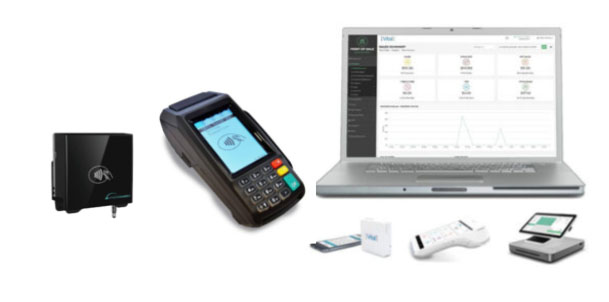
Compatible hardware (Source: CDGcommerce)
CDGcommerce is compatible with a range of card readers and terminals, including AnywhereCommerce Walker C2X ($99), DejaVoo Z11 (free but requires a $79 per year insurance fee), and Vital POS (custom pricing).
- $0 cancellation fee
- Lowest processing rates available for B2B and high-ticket businesses (at least $200,000 per month)
- Fraud detection and reimbursement services
- Virtual terminal
- Customer, loyalty, marketing tools
- Scheduling and appointment tools
- Donation and campaign management for nonprofits
- Assistance pairing you with a payment gateway
- PayPaste CRM and invoicing tools ($199 per year)
Chase Payment Solutions: Best for Same-day Deposits

Pros
- Highly affordable Chase Smart Terminal that is often on sale
- Flat pricing structure, great for SMBs
- Built-in advanced analytics (Chase Customer insights)
- Same-day deposits for Chase Business Banking customers
Cons
- Very basic POS system
- Limited native online payment tools (needs integration)
- $25-$100 chargeback fee
- Must contact sales to create an account
Overview
Who should use it:
New merchants and those with a Chase business checking account; Chase is also the best choice if your business depends heavily on cash flow and would benefit from fast deposits.
Why I like Chase:
Chase Payment Solutions is Chase Bank’s merchant account service for businesses. I like that it works directly with SMBs despite being a global banking institution. And it does not just provide direct payment processing service for the sake of it.
Chase has a competitive SMB offering with traditional merchant accounts, zero merchant account fees, fast payouts, a wide range of payment hardware options, and compatibility with any POS software.
So, if you run a small retail business that depends heavily on cash flow and you want flexibility over your POS system, Chase is the better option than Square.
What’s more, every Chase Payment Solutions account comes with Chase Customer Insights, which combines Chase’s merchant account acquiring data and its card issuing data. The result is actionable recommendations based not only on your business’s transactions but also on how it compares against similar businesses in your area.
However, note that Chase has its own mobile POS solution, though the features are basic and lack integrations to allow for scalability. That said, its system is compatible with most POS software in the market, and its payment terminals can integrate seamlessly with their hardware. To me, this versatility with POS systems ultimately gives Chase Payment Solutions an edge over other top competitors like Square and Helcim.
- Merchant processing fee: $0 per month (includes mobile POS software for handheld POS terminal)*, from $9.95 for ecommerce
- Card-present transaction fee: 2.6% + 10 cents
- Card-not-present transaction fee: 2.9% + 25 cents
- Chargeback fee: $25-$100
- Contract length: Pay as you go (customizable)
- Setup fee: $0
*Merchants using a Chase Business Checking account are subject to a $15 monthly fee if the minimum balance of $2,000 is not met.
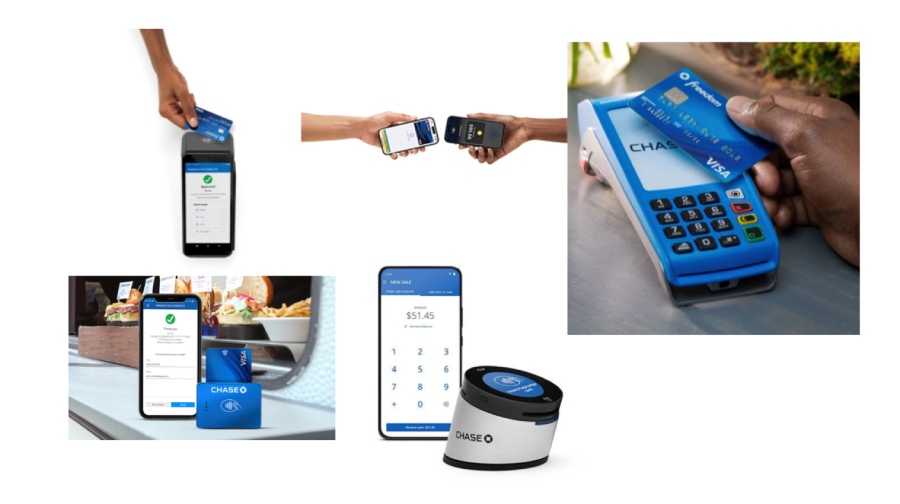
Chase card terminals (Source: Chase)
Chase provides mobile ($49.95), countertop card terminal ($299 to $399), and handheld wireless POS terminal ($499) to accept credit card payments.
- Account and hardware setup takes minutes
- Terminal is mobile- and cash wrap-compatible
- Free same-day and next-day payouts
- Virtual terminal
- Affordable hardware options
- Best-in-class business analytics
- Interchange-plus and custom pricing plans available
- Advanced analytics
- 24/7 live support
Learn more: Read why Chase consistently lands on our list of best merchant services.
PayPal: Best for International & Online Retail

Pros
- Known and trusted platform by consumers
- Instant deposits into your PayPal account
- Easy to sign up
- International payments accepted; works with hundreds of currencies
Cons
- Complaints of frozen funds
- Complex pricing structure
- Very simple POS system
Overview
Who should use it:
Retailers such as gift shops and specialty shops that cater to tourists and retailers who sell online
Why I like PayPal:
PayPal is a pioneer and trusted name in the payments industry. It frequently makes our list of best online payment processors because its payment gateway is one of the most flexible and easy to use/ easy to integrate on the market.
My favorite PayPal feature is that you can add it as a payment option for customers regardless of whether or not PayPal is your primary payment processor.
With over 200 countries and 25 currencies supported, PayPal is the fastest and easiest way to start accepting payments if you have lots of international customers.
Like Square’s Afterpay, PayPal has a buy now, pay later (BNPL) system, PayPal PayLater. The difference is that customers get a choice between four payments or monthly installments. PayPal says its PayLater order values are 20% higher than standard PayPal orders. That said, you may want to familiarize yourself with PayPal’s rates before signing up, as its fee matrix can be complicated.
- Merchant processing fee: $0 per month (Free POS software optional)
- Card-present transaction fee: 2.29% + 9 cents
- Card-not-present transaction fee: Starts at 2.99% + 49 cents
- Chargeback fee: $20 (for US merchants)
- Contract length: Pay as you go
- Setup fee: $0
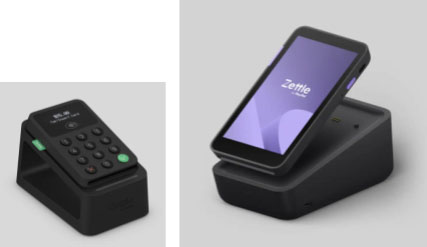
PayPal card reader and handheld POS (Source: PayPal)
Similar to Helcim, PayPal provides a mobile card reader with PIN pad ($29-$79) and a stand alone touchscreen handheld POS ($199-$269) for accepting payments.
- Highly trusted by consumers
- Works alongside other payment processors
- Operates in at least 200 countries and 25 currencies
- Free mobile POS with Zettle
- No limits on processing—good for occasional use or big businesses
- Instant payouts to PayPal accounts
- Accepts international payments
Learn more about PayPal:
- Know the pros and cons of PayPal for small businesses
- For more in-person POS services, read our PayPal Zettle review
Shopify: Best for Ecommerce & Omnichannel Sales

Pros
- Easy to sign up
- Omnichannel selling
- Third-party payment processor allowed
- Shop Pay one-click checkout
Cons
- No free plan available
- Chargeback protection fee
- Complaints of account holds and reserves
Overview
Who should use it:
Ecommerce merchants who use the Shopify platform
Why I like Shopify:
Shopify Payments is the credit card processing service that comes free with every Shopify ecommerce or POS account. This makes Shopify Payments the obvious choice for those already using Shopify as an ecommerce or POS platform.
Shopify is powered by Stripe, which means it benefits from Stripe’s advanced security features. Though the mobile payment terminal options are limited, I like that Shopify’s POS hardware fully supports both iOS and Android tablet setups, which to me, makes it a truly complete omnichannel platform.
Unfortunately, like Square, however, Shopify Payments is exclusive to Shopify users. That said, Shopify supports a wide range of payment processing tools and services, such as Shop Pay for one-click online checkouts and cross-border payments (which Square does not do).
- Merchant processing fee: $5 per month (payments only)* or $39-$399 per month (includes POS software)
- Card-present transaction fee: 2.4%-2.7%
- Card-not-present transaction fee: 2.4% + 30 cents to 2.9% + 30 cents
- Chargeback fee: $15
- Contract length: Pay as you go
- Setup fee: $0
- Payment/POS hardware: $49-$459
*The payments-only Shopify plan includes an additional 5% for all transactions
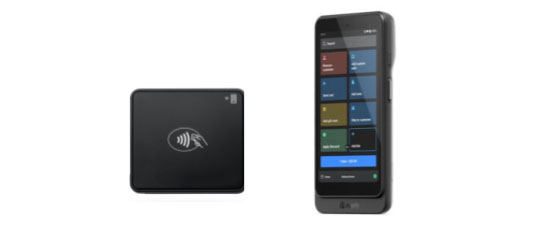
Shopify card reader and POS terminal (Source Shopify)
Shopify also provides a mobile card reader ($49) and a standalone POS terminal ($399) for accepting credit card payments.
- Omnichannel selling features
- Advanced inventory management
- Built into Shopify ecommerce and POS
- Data security powered by Stripe
- Stored payments
- One-click checkout with Shop Pay
- Third-party payment processing options
- Extensive app marketplace
- Shipping discounts
- Built-in fraud analysis tool
- Relatively low chargeback fees
- Free trial available
Find out if Shopify is the best for your:
- Ecommerce business, with our Shopify ecommerce review
- POS business, with our Shopify POS review
Methodology: How I Evaluated the Best Retail Credit Card Processing Providers
I evaluated dozens of retail credit card processors on 20-point criteria, narrowing down my selections based on their scores and also the processors’ standout features. I graded each provider according to their cost-effectiveness, range of payment functionalities, scalability, and small business-friendly terms. I also factored in feedback from real-world users and our own experience working with each merchant services provider.
After careful consideration, Square emerged as the top retail payment processing provider. I find that it offers the best value for payment processing and hardware that works best for small and new businesses. Square’s free plan offers a complete system of POS, payments, ecommerce, and hardware that is rarely matched by its competitors.
Click through the tabs below for our full evaluation criteria:
25% of Overall Score
30% of Overall Score
25% of Overall Score
20% of Overall Score
What Is Retail Credit Card Processing?
Retail credit card processors are primarily used for in-person payment processing, particularly for storefronts (brick-and-mortar). However, this could also include in-person mobile options such as accepting payments in popup stores, trade shows, and farmer’s markets.
Many retailers also need to accept payments for online orders or through an online store.
A retail payment processing system requires several functions. Merchants need software to manage their products and another to securely accept payments. The best retail credit card processing service supports both needs without a huge price tag.
What Do Retailers Need to Process Credit Card Payments?
Accepting credit card payments online or in-store is easier than ever. You need just a couple of things to start accepting payments.
- Payment processor: This can be a merchant account plus a payment gateway, or it can be an aggregate payment processor like Square. The payment processor accepts the payment and transfers the money into your account for a small fee.
- Hardware: If you accept credit cards in person, hardware completes your credit card payment system. Sometimes, this is as simple as your mobile phone with the app loaded. However, there are full-scale POS systems with barcode scanners, registers, and even scales. Talk to your payment processor about what they offer.
As your business grows and you look for more opportunities to sell, you can build up your system with any of the following:
- POS software: If you are selling in person, especially for retail or restaurant, then a point-of-sale system is the easiest way. You can load your sale items, track payments, customers, and inventory, as well as collect and process credit card payments.
- Virtual terminal: This is best for mail order/telephone order (MOTO) sales and service industries. A virtual terminal lets you collect and process payments from your computer screen without all the bells and whistles of a POS system.
- Online store: Selling online is practically a must, even for brick-and-mortar stores. The best online stores sync with your POS system and payment processor for inventory, sales, and customer tracking.
- Mobile payments: Some payment processors have a mobile POS system, while others have a much simpler interface that simply takes payments. These are good for on-location services like home repair or for selling at farmers’ markets.
Get more details in our article on accepting credit card payments.
How to Choose the Best Retail Payment Processing Service
Choosing the best credit card processing for retail stores is not only about price (although that is important). Want to ensure the processor is the best fit for you? Be sure to consider all of the following:
- Price: There are two kinds of pricing: flat rate and interchange-plus. Interchange-plus is usually cheaper but can fluctuate, so you may not know exactly how much you are paying in processing fees until you get your bill. On the other hand, many interchange-plus merchant accounts charge a membership fee, which could end up costing you more if you don’t process enough.
- Contract: Nowadays, you can easily find a payment processor that allows month-to-month accounts, although high-risk merchants usually need to sign a contract. Some may require a contract if you use their hardware. If you choose a processor with a contract, read it carefully for exit fees.
- Tools: Business tools like POS systems, virtual terminals, and even same-day payouts, can add to your overall price, so consider what the payment processor offers as far as free tools.
- Reputation: A great price is no good if you are hit with hidden fees, your account gets frozen without warning, or the processor itself isn’t reliable. Check out our reviews and third-party user reviews and talk to fellow shop owners about their experiences.
- Security: At the bare minimum, you need a payment processor that is Payment Card Industry (PCI)-compliant but also look for chargeback protection, fraud alerts, and other technology that keeps your business and customer data secure.
See our merchant account application guide for more tips and a step-by-step walkthrough:
Frequently Asked Questions (FAQs)
These are some of the most common questions we encounter about retail payment processors.
This depends on your needs and the payment processor you choose. Keep in mind that the cost is not just the payment processing fees, but also the software and hardware you use to collect the payments. In general, we suggest planning up to 5% of your budget for retail payment processing.
Merchant credit card processing simply means signing up with a merchant payment provider so that you can accept credit cards, debit cards, and other forms of electronic payment. The payment provider (sometimes called the merchant account) handles the transaction between you, the card, and the customer’s bank, and places the money (minus a fee) into your bank account.
The cheapest way depends on your business type and how much you process in a month. For example, if you are a brick-and-mortar store that processes under $10,000 in a month, then a flat-rate payment processor with a free POS system is your cheapest option.
For over $10,000 in processing fees, interchange-plus pricing may be a better bet. However, you should also factor in any membership or other fees as well as POS costs.
Naturally, the more free tools you get, the lower your overall expenses, but also consider chargeback fees, especially if you sell online. To get the best credit card processing for small businesses, look for services that offer things like POS systems and virtual terminals.
Small businesses with transaction volumes below $10,000/month typically receive a simple flat rate of around 2.6-2.7%. Online transactions are charged around 2.9%. If a merchant manually enters a customer’s credit card details into their system to make a payment, transaction fees fall around 3.5%. Once your sales volume is consistently over $10,000 per month, you can likely negotiate custom or lower rates.
There are mobile-based POS apps with a built-in payment service that can be downloaded to your smartphone or tablet to start accepting payments. Even without a card reader, there is an option to manually enter the customer’s payment information. However, please note that the cost for keyed-in payments is significantly higher than tapped, dipped, or swiped transactions. Another option would be to use NFC-enabled smart devices where you can accept payments via digital wallets and QR codes.
Bottom Line
In today’s consumer-driven economy where customer preference dictates how your business will fare, it’s hard to have a successful retail business without accepting credit cards. Fortunately, there are credit card processors that work for even the most casual retailer. When looking for the best credit card processing for small business, however, consider not only the price, but tools offered, reliability, data security, and customer support.
Square earned the highest score in our evaluation of the best retail store credit card processing companies. I loved its simple flat-rate, transparent pricing, and the number of free business-supporting tools it has to offer. The platform offers tons of a wide range of integrations and is consistently our top pick for POS systems, for retail and beyond.
